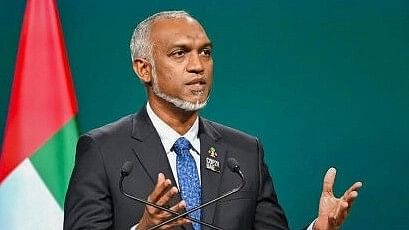
Maldivian President Mohamed Muizzu.
Credit: PTI File Photo
The unfolding political developments in the Maldives, in which the opposition parties that control parliament are planning to impeach the newly-elected President Mohamed Muizzu, portend ill winds over the Indian Ocean nation.
Muizzu won because of a fracture in the Maldivian Democratic Party due to a fallout between its two top leaders, founder Mohamed Nasheed, and Ibrahim Solih, who went against Nasheed’s wishes to contest a second term. Solih, as President, had actively pushed an ‘India First’ foreign policy.
But he lost to Muizzu in the first round by the exact number of votes polled by Nasheed’s breakaway group, the Democratic Party. In the second round, in which it was just Solih vs Muizzu, Nasheed’s support helped Muizzu win a majority.
Now, the MDP and Democratic Party MPs have joined hands in a plan to impeach Muizzu weeks before the term of this parliament is to end. Before this, the MDP-dominated parliament withheld approval to four members of Muizzu’s chosen cabinet.
Delhi, which greeted the election of Muizzu with undisguised dismay – as Mayor of Male, he had supported the two-year-long ‘India Out’ campaign led by former President Abdulla Yameen – is certain to be accused of instigating his political troubles, as the reason being given for the planned impeachment is that he has endangered the Maldives by alienating India.
The Modi government had made it known that it did not take kindly to Muizzu’s choice of Turkey for his first official visit abroad. While India failed to work out dates for his visit to Delhi, by the time of his acceptance of Beijing’s invitation for his next official foreign visit, a nascent #Boycott Maldives campaign was already rearing its head on social media.
Prime Minister Narendra Modi’s high praise of Lakshadweep gave this campaign wings. The response from Maldives was hardly restrained, with three of Muizzu’s ministers joining the fray with disparaging remarks about the Indian Prime Minister.
It appears that Muizzu’s suspension of the ministers did not satisfy India, and his pronounced China tilt after his Beijing visit seems to have been designed to poke Delhi in the eye.
Still, Delhi must remain hands off the political battle raging in the Maldives. Whenever regime change is perceived to have foreign backing, it ricochets on the purported foreign power.
That lesson is clear from the Mahinda Rajapaksa defeat of 2015, which he blamed on India, and which both he and his brother Gotabaya invoked in their 2019 re-election, which they won, to become Prime Minister and President, respectively.
Subsequently, the brothers were booted out by their own people, reinforcing that regime change has to be an internal process. Maldivian parliamentary elections are due in mid-March.
That should provide an indication of Muizzu’s standing among his people. On the other side of the coin, had India cautioned Solih against going overboard on his ‘India First’ policy -- even criminalising anti-India protests -- matters may not have come to this pass. Irrespective of whether Muizzu stays on or steps down, if Delhi is seen as pulling political strings in Male, it is India that will be the loser.